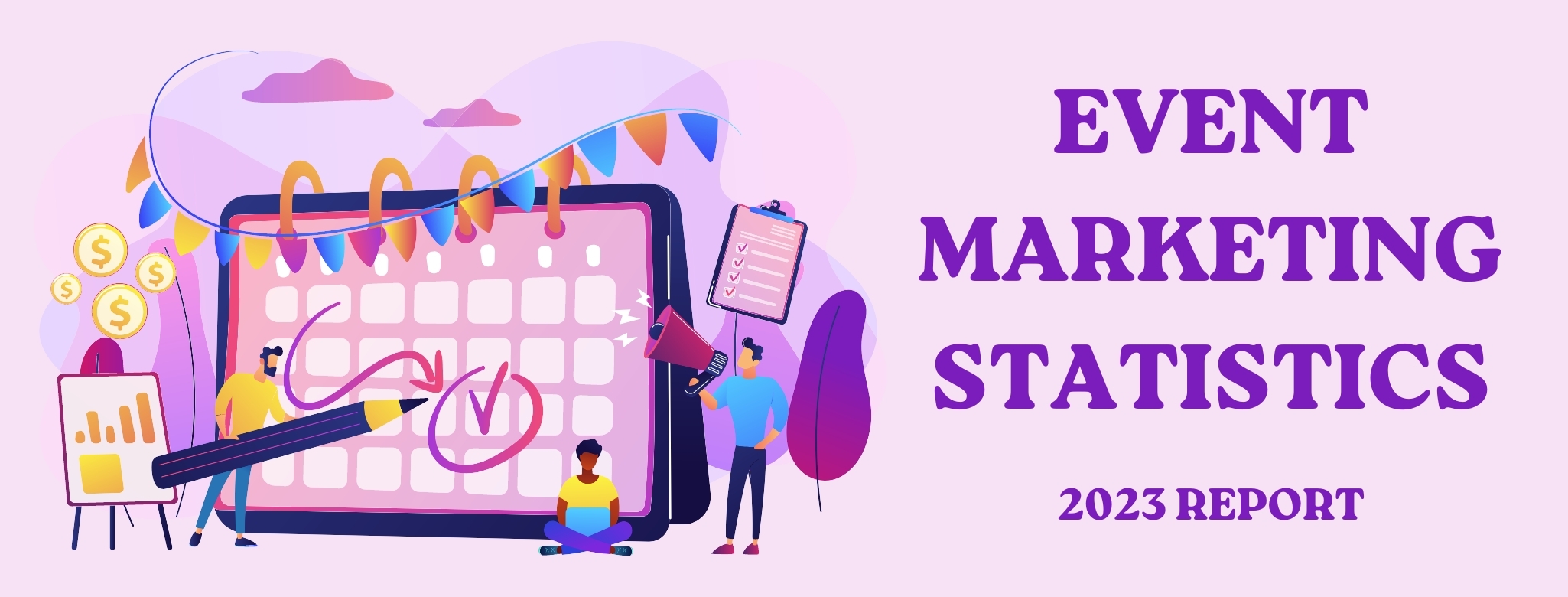
31 May TOP EVENT MARKETING STATISTICS IN 2023
The event industry was dealt a heavy blow when the pandemic hit, and in-person events came to a screeching halt. However, there is reason to believe that the industry will soon recover. A survey of event professionals found that 67% believe that in-person meetings will return to pre-pandemic levels within one to two years. This sentiment is echoed by 61% of marketers, who believe that in-person events are the most critical marketing channel. While some events will remain virtual, 40% of respondents said that they think in-person events will come back by 2023. In the future, executives believe that all in-person events will have a virtual component, with 50.7% of respondents saying they think this will be the case. These trends suggest that the event industry is on the road to recovery and that in-person event will once again play a vital role in our lives.
Below, we highlight 15 Top Event Marketing statistics for 2023:
Event Marketing Statistics (Editors Choice)
- The global event industry was worth approximately 890 billion U.S. dollars in 2020
- 67% of event professionals believe in-person meetings will return to their pre-pandemic numbers within one to two years
- 61% of marketers believe that in-person events are the most critical marketing channel
- 35% of events in 2022 will be hybrid, based on a survey of 8,227 marketers
- 50.7% of executives think that in the future, all in-person events will have a virtual component
- The global market size value of the virtual event industry was $114.2 billion in 2021
Event Marketing Statistics: 15 Top Event Marketing Statistics in 2023!
Event Marketing Statistics #1: The global event industry was worth approximately 890 billion U.S. dollars in 2020.
According to Statista, the global event industry was worth approximately 890 billion U.S. dollars in 2020. This value is expected to grow to more than two trillion U.S. dollars by 2028. The event industry includes businesses that plan and organize events, as well as provide related services such as catering, event planning, and entertainment. The industry has been growing steadily in recent years, driven by factors such as the increasing popularity of destination weddings and the growth of the business events market. With the COVID-19 pandemic causing a significant slowdown in 2020, the event industry is forecast to rebound strongly in the coming years.
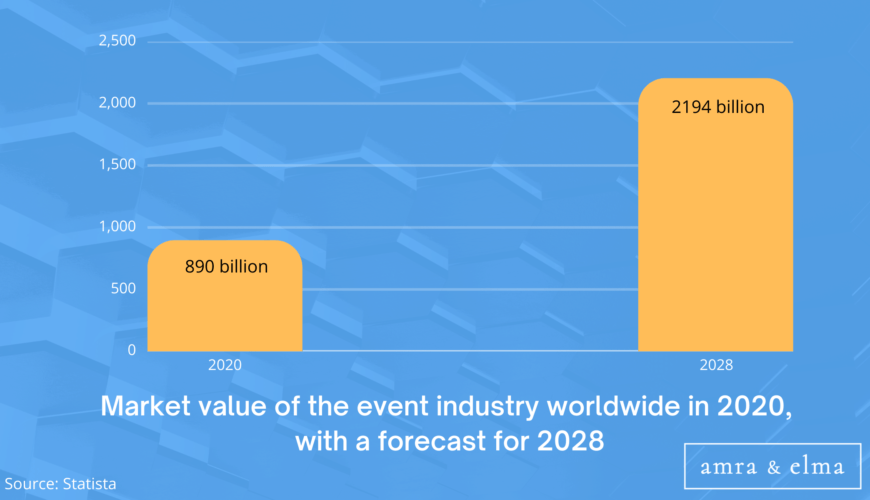
Event Marketing Statistics #2: 35% of events in 2022 will be in-person, based on a survey of 8,227 marketers.
According to a recent survey of 8,227 marketers by Statista, 35% of events in 2022 will be in-person. This suggests that the pandemic has significantly impacted the event industry, with many organizers opting for virtual or hybrid events in the past year. However, it seems that the tide is beginning to turn, and in-person events are starting to make a comeback. Of course, this comes with its own set of challenges, from ensuring safety protocols are in place to managing travel logistics. But there’s nothing quite like being there in person for many event-goers.
Event Marketing Statistics #3: 67% of event professionals believe in-person meetings will return to their pre-pandemic numbers within one to two years.
According to the most recent AMEX survey, 67% of event professionals believe in-person meetings will return to their pre-pandemic numbers within one to two years. The survey polled over 2,000 meeting and event planners from around the world, and the results are encouraging for the future of the events industry. While the pandemic has forced many businesses to pivot to virtual events, there is still a strong desire for in-person gatherings. For many businesses, face-to-face interactions are essential for building relationships and fostering collaboration. The events industry has been hard hit by the pandemic, but there is reason to be optimistic that in-person meetings will make a comeback in the near future.
Event Marketing Statistics #4: 85% of marketers believe in-person events have a significant impact on achieving primary business goals.
According to the most recent Bizzabo event marketing report, 85% of marketers believe in-person events significantly impact achieving primary business goals. Of those surveyed, 74% said that events are very important or somewhat critical to achieving their business goals. Over half (51%) of respondents said that events are essential for their marketing mix. These findings indicate that marketers understand the value of face-to-face interaction and believe that events are a crucial driver of business success. Events can generate leads, build relationships, and drive sales when done right. They can also raise awareness of your brand and help you to reach new audiences. With so much potential, it’s no wonder that marketers are eager to invest in event marketing.
Event Marketing Statistics #5: 61% of marketers believe that in-person events are the most critical marketing channel.
According to the most recent Bizzabo report, 61% of marketers believe that in-person events are the most critical marketing channel — a 20% increase from the previous year. This is a significant shift, reflecting the growing importance of event marketing. There is still no substitute for face-to-face interaction in an increasingly digital world. Events provide a unique opportunity to build relationships, share information, and create a lasting impression. They are also an excellent way to reach new customers and grow your brand. With more and more businesses understanding the power of events, it’s no wonder that they are becoming an increasingly important part of the marketing mix.
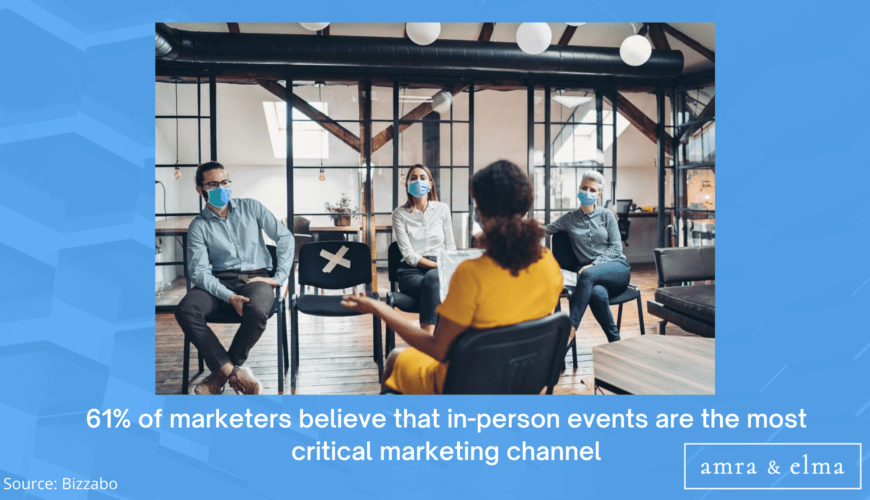
Event Marketing Statistics #6: 35% of events in 2022 will be hybrid, based on a survey of 8,227 marketers.
According to a recent survey of 8,227 marketers by Statista, 35% of events in 2022 will be hybrid. Hybrid events are a combination of in-person and virtual events, and they offer the best of both worlds. Marketers surveyed cited the ability to reach a larger audience as the main reason for choosing a hybrid event. Other benefits include increased engagement, lower costs, and greater flexibility. According to the survey, the most popular hybrid event format is a live stream with virtual breakouts (44%), followed by live stream with in-person breakouts (34%). The least popular format is an in-person event with virtual components (22%).Whatever format it might be, hybrid events are a great way to reach more people and create a more engaging experience.
Event Marketing Statistics #7: 68% of event professionals are looking for hybrid event technology that supports both in-person and virtual events.
According to the latest event marketing trends report from Bizzabo, 68% of event professionals are looking for hybrid event technology that supports both in-person and virtual events. This shift towards hybrid events is being driven by a need to reach a wider audience, as well as a desire to create more memorable and engaging experiences. The report also found that 73% of event marketers believe that technology will play a key role in making hybrid events more successful. Event professionals are therefore increasingly turning to event platforms that offer a complete suite of tools for both in-person and virtual events. By investing in the right technology, event marketers can make sure that their hybrid events are truly successful.
Event Marketing Statistics #8: 38% of event organizers say that it takes more preparation time to host a hybrid event than in-person or virtual event.
According to a survey by Markletic, 38% of event organizers say that it takes more preparation time to host a hybrid event than to host a dedicated in-person or virtual event. This is likely because hybrid events require the use of both physical and virtual spaces and the coordination of two separate logistics systems. In addition, hybrid events often involve more complex programming, as they must cater to both in-person and online attendees. As a result, hybrid events can be significantly more challenging than traditional events. However, many organizers feel that the extra effort is worth it, as hybrid events offer the best of both worlds by providing an engaging and inclusive experience for all attendees.
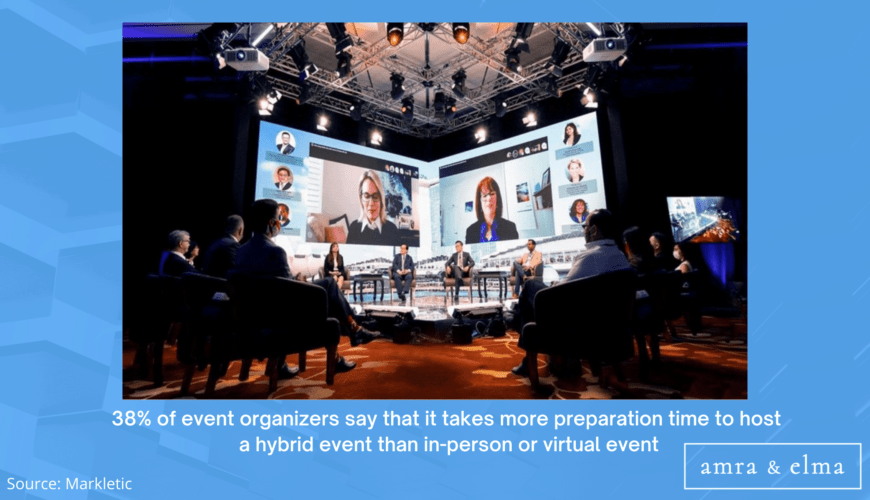
Event Marketing Statistics #9: 50.7% of executives think that in the future, all in-person events will have a virtual component.
According to a recent report by Marketing Charts, 50.7% of executives think that all in-person events will have a virtual component in the future. This is a significant increase from the 37.9% who said the same in 2019. The pandemic has forced many businesses to reevaluate their event strategies and move to a hybrid model that combines virtual and in-person elements. As a result, it’s not surprising that executives expect this trend to continue in the future. Virtual events have several advantages, including lower costs and greater flexibility. They also allow businesses to reach a global audience without the hassle and expense of travel. For these reasons, virtual events will likely play an essential role in the future of business.
Event Marketing Statistics #10: 40% of events in 2022 will be virtual, based on a survey of 8,227 marketers.
According to the most recent data from Statista, 40% of events in 2022 will be virtual. This is based on a survey of 8,227 marketers. The survey found that the number of virtual events has been increasing every year since 2016. In 2020, the number of virtual events increased by 20%. The trend is expected to continue in 2022 and 2023. The survey also found that the majority of marketers believe that virtual events are more successful than in-person events. There are several reasons for this. First, virtual events are more cost-effective. Second, they have a wider reach because they can be attended by people from all over the world. Third, they are more convenient because attendees do not have to travel to the event location. Finally, virtual events are more flexible because they can be easily customized to meet the needs of the attendees.
Event Marketing Statistics #11: 93% of event marketers plan to invest in virtual events in the coming future.
A recent report, “Post Covid-19 Event Outlook,” published by Bizzabo, shows that 93% of event marketers plan to invest in virtual events in the coming future. The report indicates that the industry is rapidly shifting its focus from in-person to online experiences. In response to the pandemic, many events were forced to go virtual. While some may have been initially hesitant, most event marketers have now seen the value of virtual events. The report found that the most significant benefits of virtual events are increased reach (64%), lower costs (54%), and flexibility/scalability (46%). With so many event marketers planning to invest in virtual events, it’s clear that this trend is here to stay.
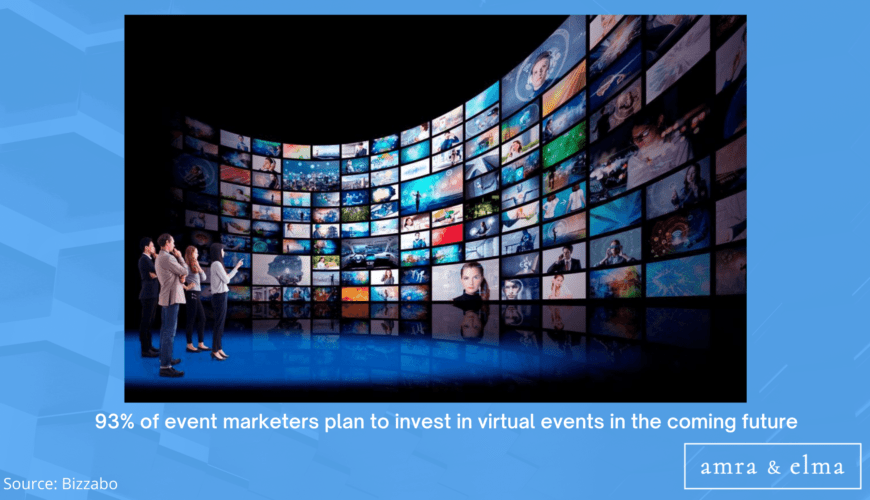
Event Marketing Statistics #12: More than 80% of event organizers have reached a wider audience with virtual events.
According to the recent report from Bizzabo, more than 80% of event organizers have reached a wider audience with virtual events. This is likely due to the fact that virtual events are not limited by geographical boundaries. Attendees can participate from anywhere in the world, and they can do so at a time that is convenient for them. In addition, virtual events tend to be more affordable than traditional events, which makes them accessible to a wider range of people. As a result, it is not surprising that virtual events are becoming increasingly popular. Given the many benefits of virtual events, it is likely that they will continue to grow in popularity in the years to come.
Event Marketing Statistics #13: 62% of virtual events are single-day events.
According to the virtual events benchmark report from Bizzabo, 62% of virtual events are single-day events. This format is popular because it is less expensive and easier to produce than multi-day events, and it allows attendees to fit the event into their schedules more easily. Single-day events also tend to be more focused, with a clear purpose and objective. As a result, attendees are more likely to walk away with valuable information and new insights. However, single-day events can also be more challenging to promote, as there is less time to build buzz and generate excitement. For event marketers, it is important to carefully consider the format of their event before making a final decision.
Event Marketing Statistics #14: 68.8% of event marketers believe it is more difficult to provide networking opportunities at a virtual event.
According to the evolution of events report by Bizzabo, 68.8% of event marketers believe it is more difficult to provide networking opportunities at a virtual event. This is because live events provide build serendipity and create organic interactions between attendees, which are essential for networking. Virtual events lack the physical connection that is key to building professional relationships. To offset this, event planners need to be creative in their approach and design their networking opportunities with intention. For example, they can use breakout rooms for small group discussions or host speed-networking sessions where attendees have the opportunity to meet several other professionals in a short period of time. By thoughtfully planned networking opportunities, event planners can help their attendees make the most of their virtual experience.
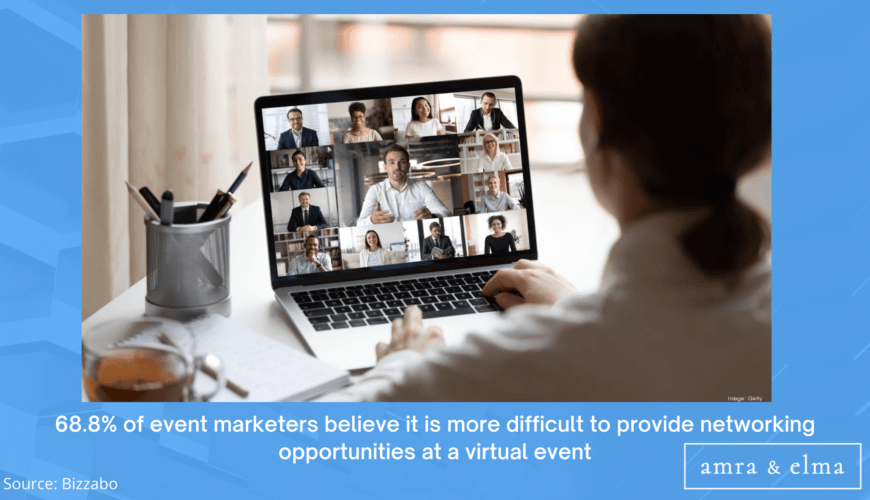
Event Marketing Statistics #15: The global market size value of the virtual event industry was $114.2 billion in 2021.
According to Grand View Research, the global market size value of the virtual event industry was $114.2 billion in 2021. The industry is expected to grow at a compound annual growth rate (CAGR) of 21.4% from 2022 to 2030. The market is driven by the rising adoption of advanced technologies, such as virtual reality (VR), augmented reality (AR), and 3D projection mapping. These technologies create realistic and immersive environments that can be used for various events, such as conferences, product launches, and concerts. In addition, virtual events are more cost-effective than traditional events, as they do not require venue rental or travel costs. As a result, the virtual event industry is expected to continue to grow in the coming years.
What Is an Event Marketing Strategy and Which One Is the Most Effective?
The purpose of an event marketing strategy is to create and execute a plan that will generate interest in and attendance at an event. Event marketing can be used to promote any type of event, from a small business networking function to a major concert or festival.
There are many factors to consider when developing an event marketing strategy. The first step is to identify the target audience for the event and craft a message that will appeal to them. Next, for the best event marketing strategy, it is important to determine the channels through which the message will be delivered and create content that is suited for each channel. Paid advertising can be used to generate awareness of the event, while PR and social media can be used to generate excitement and encourage people to buy tickets or RSVP. It’s also important to have a plan for after the event is over, such as issuing a press release highlighting how successful it was.
Event marketing strategy is a crucial factor of any event marketing campaign because it allows businesses to directly connect with their target audience in a more personal way. Events provide an opportunity for customers and potential customers to learn about a company’s products and services, as well as meet the company’s representatives and ask questions. In addition, an event marketing strategy can help businesses strengthen relationships with current customers, as well as attract new customers.
An effective event marketing strategy also offers a unique way to promote a company’s brand. Through event marketing, businesses can create a positive image for their company and build trust with customers. Additionally, events can serve as a means of generating leads and sales. By providing attendees with information about how to purchase products or services, businesses can increase their chances of making a sale.
Overall, creating an effective event marketing strategy is a measurable way to connect with customers and promote a company’s brand. The most effective event marketing strategy is one that reaches the target market and creates a connection with the audience. The most common way to reach the target market is through advertising. Advertising, as the most important part of any successful event marketing strategy, can be done through various channels, such as television, radio, print, or online. Television and radio are traditional forms of advertising, and they are still used today because they are very effective at reaching a large number of people. However, print and online advertising are also becoming increasingly popular as part of an event marketing strategy because they allow businesses to target specific audiences.
Another way to create a connection through an effective event marketing strategy is with the audience. Events can be used to generate awareness for a product or service, or they can be used to create a connection with the audience. Events can also be used to generate leads or sales. The type of event that is most effective depends on the goals of the business.
Choosing the right event marketing strategy can be difficult because there are so many options available. The most important thing to remember is that the event should be tailored to meet the goals of the business.
Conclusion
As we move further into 2022, event marketers need to be aware of some key statistics that are likely to impact the industry. First and foremost, it is expected that online event attendance will continue to rise. This is due to the continued growth of the virtual event space, as well as the fact that more people are becoming comfortable with attending events online. In addition, it is worth noting that budgets for event marketing are expected to increase in 2022. This is in part due to the fact that companies are starting to recognise the value of events as a marketing tool, and also because of the continued growth of the industry as a whole. With this in mind, event marketers should be prepared for a busy and potentially lucrative year ahead.
TOP EVENT MARKETING STATISTICS IN 2023- FAQ:
How effective is event marketing?
Event marketing is the most effective content tool, 67 percent of event marketers believe. According to Forrester, event marketing makes up the largest portion of B2B marketing budgets, about 20 percent.
What is event marketing with example?
Event marketing puts the focus on the engagement created between attendees and the brand that is hosting the event, effectively immersing attendees into the brand and its value.
Why is event marketing so important?
Event marketing give marketers a key opportunity to build relationships and trust with a prospective customer by offering that personal touch that digital can often lack. For consumers, it’s an opportunity to directly engage with companies and get a feel for their individual brand personality.
What are benefits of events?
The main benefits of events is that a successful event provides value to attendees beyond information about a product or service. By finding an opportunity to interact with the right demographic of people — both current customers and prospective buyers — brands can develop positive brand attitudes and long-lasting relationships.
Who is an event marketer?
An event marketer is someone who specializes in the marketing of events. An event marketer works to create and execute marketing plans and strategies to generate attendance and interest in their events. An event marketer must be skilled in a variety of marketing disciplines, from public relations and advertising to social media and digital marketing. They must also be knowledgeable about the event industry and the various types of events that are available. An event marketer uses a variety of tactics to promote events, including online ads, email campaigns, social media posts, and press releases. An event marketer also works with event promoters and venues to secure sponsorships and partnerships, and to negotiate contracts with vendors.
An event marketer is responsible for planning and executing marketing campaigns to promote a specific event. This may include creating and executing digital and traditional marketing plans, managing sponsorships and partnerships, and working with the media to generate publicity. An event marketer must have a strong understanding of both marketing and event management principles to create successful campaigns. An event marketer must also be able to manage budgets and timelines, as well as coordinate with other members of the event team to ensure that the event runs smoothly.
What are the main responsibilities of an event marketer?
An event marketer is responsible for planning and executing marketing campaigns to promote an event. They work with event planners and organizers to create a marketing strategy that will generate interest in the event and drive ticket sales. An event marketer is responsible for creating all of the marketing materials for the event, including the website, advertising, and social media content. They also work with the venue to arrange promotional partnerships and discounts, and they coordinate publicity efforts to get the word out about the event. In addition, an event marketer is responsible for tracking the effectiveness of the marketing campaigns and making adjustments as needed.
Why is it important to have an event marketer?
The job of an event marketer is to orchestrate a finely tuned marketing mix and develop high-impact industry event that reaches the target audience in the most effective way possible. The event marketer has a unique and important role within this mix. An event marketer understands how to create and execute marketing plans that generate excitement and interest in an event. An event marketer is an expert at creating a buzz around an event, generating attendance, and maximizing the return on investment for their clients.
An event marketer has a deep understanding of the promotional landscape and knows how to navigate it to reach their target audience. An event marketer uses traditional marketing methods such as advertising and public relations, as well as newer methods like social media and event apps. They are also experts at developing creative marketing collateral such as logos, banners, and taglines.
An event marketer is an essential part of any successful event. They help create an engaging experience for attendees that will leave a lasting impression.

